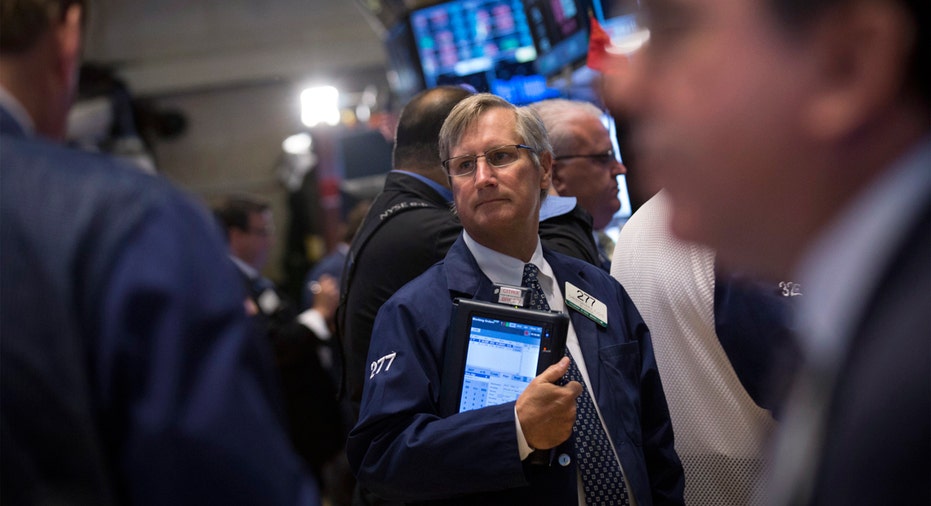Stocks Deteriorate After Yellen Remarks, Drop in Energy

U.S. equity markets lost momentum late in the session as traders parsed a speech from Fed Chief Janet Yellen on her expectations for an interest-rate hike, and as the energy sector saw steep declines.
The Dow Jones Industrial Average was down 157 points, or 0.88% to 17731. The S&P 500 slipped 22 points, or 1.09% to 2079, while the Nasdaq Composite declined 33 points, or 0.64% to 5122.
All 10 S&P 500 sectors were in negative territory with energy plunging more than 3%, followed by utilities, which shed more than 2%.
Today’s Markets
Just a day after rallying, stocks reversed course after comments from Federal Reserve Chief Janet Yellen, which indicated a rate rise is likely at the FOMC meeting in two weeks.
In a speech before the Economic Club of Washington, Yellen said most Fed officials anticipate moving gradually, and there is no plan to hike interest rates in a calendar-based way. She also indicated that the economy remains on the road to recovery.
Stuart Hoffman, chief economist at PNC, said in a note Yellen’s remarks struck a fairly optimistic tone, and she appears ready to begin the normalization process, though she has made clear tightening will be gradual once liftoff begins.
“Yellen's one comment of most interest in her Q&A with David Rubenstein is that she does not need unanimity in the FOMC's decisions and she even expects dissents at "critical junctures." Another answer emphasized that there is no "mechanical plan" to raise the funds rate after the first rate hike,” Hoffman noted.
The Fed chief’s comments come a day before the European Central Bank meets and is largely anticipated to ease monetary policy there further. The move would mark a divergence between the Fed and other central banks around the world.
To that point, eurozone consumer price data came in below expectations, and IG market analyst Joshua Mahony said it's clear the eurozone is nowhere close to escaping disinflation.
“Despite positive revisions to both October readings, the fact is that the eurozone inflation picture is not improving, and this provides [ECB President] Mario Draghi with further basis for easing when he takes to the stand tomorrow,” he wrote in a note.
Meanwhile, Atlanta Fed President Dennis Lockhart delivered remarks at the Broward Center for Performing Arts in Fort Lauderdale. He said while he “won’t predict what the committee will do,” he believes judging from recent data including third-quarter GDP and the October jobs report, a “moderate pace” of growth is likely to be sustainable, and the case for liftoff is “compelling.”
The Federal Reserve’s anecdotal Beige Book report – which outlines economic conditions in all of the central bank’s 12 districts – was also released on Wednesday, and indicated economic activity across all of the Fed’s 12 districts expanded modestly. The strength was largely attributed to an uptick in consumer spending, while conditions in the manufacturing sector and tourism were mixed. Some districts noted factors like the strong dollar, low commodity prices, and weak global demand weighed on their factory activity.
In recent action, the yield on the benchmark 10-year U.S. Treasury bond rose 0.023 percentage point to 2.180%. The euro, meanwhile, fell 0.14% against the U.S. dollar, while the greenback rose against a basket of global currencies.
While the focus on Wall Street was largely on the Fed, traders continued to monitor economic releases which the central bank has said will be essential in determining when it's appropriate to hike interest rates.
According to payroll processor ADP, private payrolls added 217,000 jobs in November, the most since June. October figures were revised up to 196,000 from 182,000.
Elsewhere in the market, commodities were in the red as global oil prices resumed their downward trajectory as inventories in the U.S. continued to grow, adding to the global supply glut, and as investors anticipate OPEC will keep production at current levels after its meeting this week. Weekly crude inventories from the EIA showed a build of 1.18 million barrels compared to expectations for a 0.5 million barrel decline.
U.S. crude traded down 4.56% to $39.34 a barrel, while Brent, the international benchmark, declined 4.28% to $42.66 a barrel. For WTI, it was the first settle below the $40 a barrel mark since August and the biggest drop since October.
Big names in the space including heavyweights Exxon (NYSE:XOM) and Chevron (NYSE:CVX) were the top declinerson the Dow during the session, shedding more than 2% each, and shaving about 26 points off the index.
Metals, meanwhile, were lower as gold declined 0.90% to $1,054 a troy ounce, while silver slid 0.54% to $13.97 an ounce, and copper declined 1.81% to $2.03 a pound.
In corporate news, Yahoo investors anxiously awaited the fate of Internet search giant Yahoo (NASDAQ:YHOO). According to reports, the company’s board is planning a series of meetings through the end of this week, and is considering a sale of Yahoo’s Internet business, or proceeding with a previous plan to spin off its $30 billion investment in Chinese e-commerce giant Alibaba (NYSE:BABA).
Yahoo shares jumped on the news, but the company declined to comment on the reports.



















